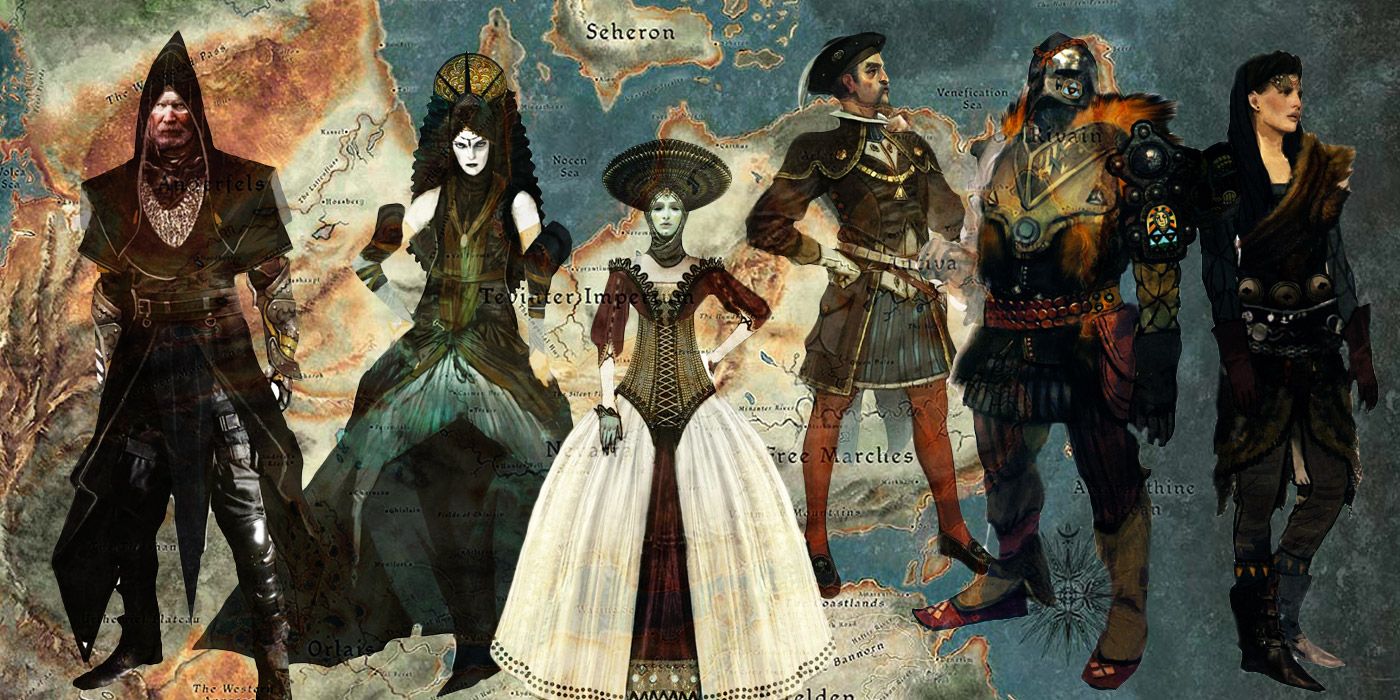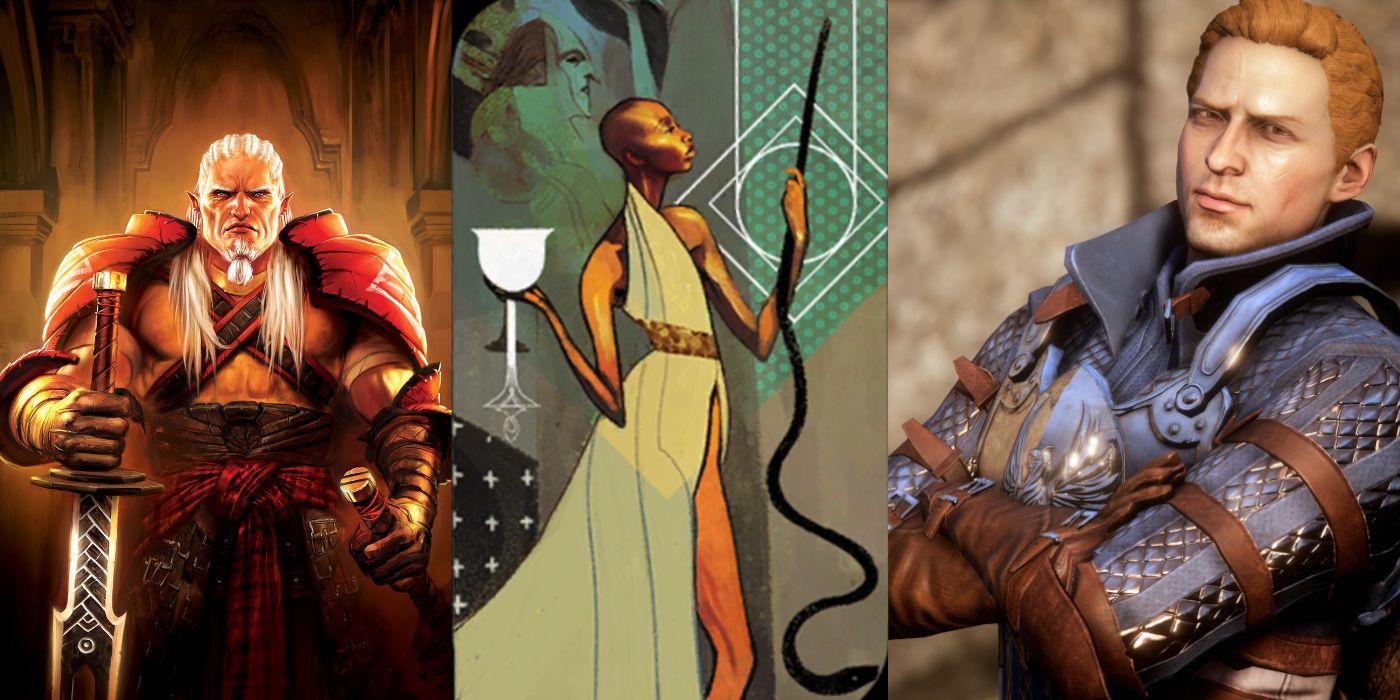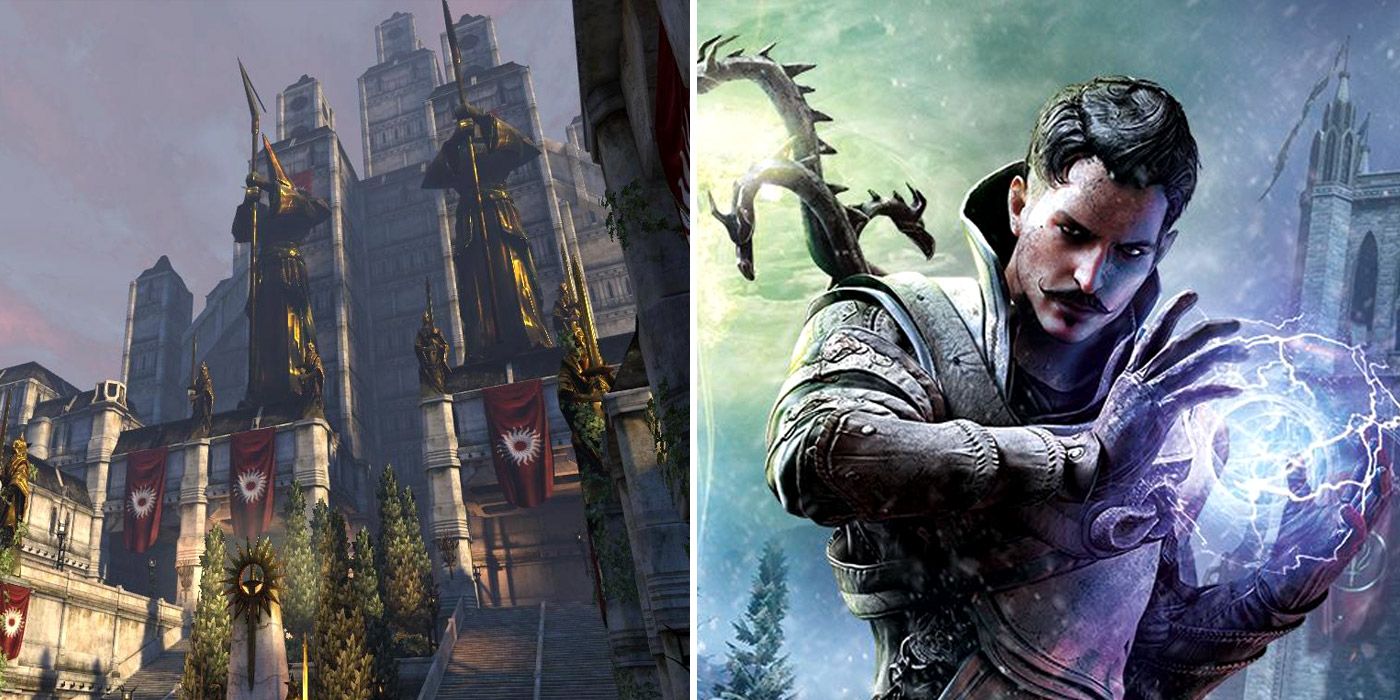Accents have had a huge role to play in fantasy media since the genre leapt off the page and onto the big and small screens, including in video games like the Dragon Age franchise and its new upcoming installment, Dragon Age 4. Accents have been a hint into the influences behind different fantasy cultures, and are tied up with history, fan expectations, and presumptions.
The accents of Dragon Age were originally planned to be more extensive and rigorously applied, but the franchise has had a wavering relationship with some of the voices of the fantasy continent of Thedas. Dragon Age 4 is now placed in an interesting conundrum when it comes to the accent of its likely setting, Tevinter. Here’s the history of the voices chosen for Dragon Age’s races and nations, and where the franchise may go in the future
The Voices of Thedas
Like many fantasy worlds, the nations of Thedas have rough cultural equivalents in real world medieval Europe. Ferelden might be considered Britain, Orlais would be France, and Antiva would be Spain while the Qunari conquerors that entered from the North via Par Vollen represent the Moorish forces that would cross the Strait of Gibralter in 711 AD. Nevarra’s emergence as a dominant force near the Free Marches – independent city states – mirrors the rise of Germany, while the shrinking borders and strategically adopted religion of the Tevinter Imperium resembles Byzantium. None of these parallels are one-for-one, with BioWare taking broad influence from some of these places and their histories while building its continent.
However, the accents of Dragon Age give players some of the most help in figuring out just what basic assumptions they are supposed to have about these foreign lands. Dragon Age: Origins takes place entirely within Ferelden, for example, but Leliana’s French accents not only makes it clear that Orlais is a parallel to medieval France in terms of its power, but also makes the parallels between the Chantry's prophet Andraste and Joan of Arc clear as well as a few cultural touchstones. Orlesians, for example, take great pride in their food. Leliana’s accent does a surprisingly subtle amount of heavily lifting for how unsubtle the accent itself is, helping align player assumptions about places not seen in the game without dropping a load of exposition on them.
A few accent rules that have been established so far in the Dragon Age games are that characters from Orlais speak with a faux-French accent, characters from Ferelden speak with English accents, and characters from Antiva speak with Spanish or Italian-inspired accents. Qunari speak in gruff American accents, and so do most of the Dwarves who don’t speak in English accents. City Elves tend to speak in American accents, while Dalish Elves speak in English or Welsh accents.
Again, accent works to give hints into the history of the races of Thedas. Dragon Age 2’s Merill speaks with a Welsh accent, and the near-destruction of the native Celtic population that would preserve the Welsh language by the Anglo-Saxons mirrors the fate of the Elves of Thedas at the hands of the humans. Dragon Age’s Dwarves were originally intended to have German accents, and though this was dropped, the accents of characters like Cassandra in Inquisition seems to support the idea that Nevarra is the closest equivalent to Germany in Thedas.
Tevinter's Accent
Dragon Age’s half-commitment to cultural accents had put the series in a bit of strange position for Dragon Age 4. It is very likely that Dragon Age 4 will take place in Tevinter, which is arguably the most foreign region explored so far in the game. While Ferelden and Orlais are closely related geographically and culturally, Tevinter is the oldest human nation on the continent, has its own version of the Chantry considered blasphemous by the version found in Ferelden and Orlais, and has a government run by mages, which would be unthinkable to the South.
However, while Ferelden and Orlais have very different accents, companion characters like Dorian in Dragon Age: Inquisition imply that the Tevinter Imperium will make use of the same standard British accents found in Ferelden, despite being surrounded by countries which all have different accents of their own. Dragon Age 4’s Tevinter has cast a long shadow across all the games so far. It is supposedly the nation whose leading mages led to the inadvertent creation of the darkspawn, and is the country most closely tied to the Qunari invasions and the enslavement of the elves of any nation seen in-game so far.
In short, Tevinter is a looming and intimidating presence in Thedas, and having the characters speak in the same accents as those in Ferelden could risk making the setting feel too familiar too quickly, as well as implying a non-existent direct connection between Ferelden and Tevinter that doesn't exist for the other nations. As the center of an empire, it's possible that Tevinter will overcome its accent problem by having a more diverse cast of characters from across Thedas and beyond. It’s more likely, at least, that players will get a greater hint into the lands north of Thedas where the Qunari come from than previous games have given them just by virtue of their geographic proximity.
While games like World of Warcraft have strict accent rules for every race, and others like The Elder Scrolls have Nords with American and Scandinavian accents who grew up in the same village, Dragon Age has been notably inconsistent with its accents. Many may not recognize this and it's easily attributed to world-building, but it's a quandary nonetheless.
Moreover, there will be many other factors at play. Tevinter’s architecture, its clothing, and its citizens' priorities are all ways that the kingdom could be made to feel distinct from those in previous games. The way people in Tevinter speak, even if it’s with the same British accents found in Ferelden, could also be a great way to begin overcoming the problem. One thing’s for sure: with so many factions and interests set to battle over Thedas’ fate in the next game, distinguishing their voices – literally or metaphorically – will be interesting to see in Dragon Age 4.
Dragon Age 4 is in development now.



